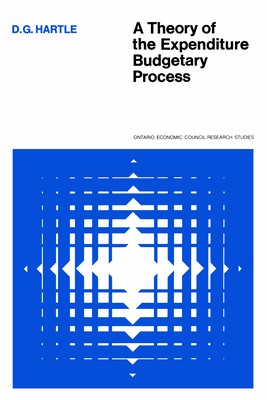
- We will send in 10–14 business days.
- Author: Douglas G Hartle
- Publisher: University of Toronto Press
- ISBN-10: 0802033415
- ISBN-13: 9780802033413
- Format: 15.2 x 22.9 x 0.7 cm, minkšti viršeliai
- Language: English
- SAVE -10% with code: EXTRA
Reviews
Description
This crisp, provocative, lively, sometimes opinionated analysis is an important contribution to the scanty Canadian literature on the politics of the budgetary process. It is an important theoretical contribution to the study of political decision-making made by an economist.
Speaking from personal experiences of the administrative struggles that lie behind evolving federal expenditure priorities, Professor Hartle offers an original, and at times devastating, review of the theories of public decision-making advanced by such analysts as Downs, Breton, Niskanen, and Wildavsky. He argues that their inadequacies can be overcome if politics, like the economy, is recognized as a process in which individuals and groups seek to maximize their satisfactions. He shoes how the federal budget is the outcome of a series of utility-maximizing games between politicians, bureaucrats, interest-group leaders, journalists, and voters. His approach is clearly applicable to decision-making in all organizations, both public and private.
This study will appeal especially to economists and political scientists as an example of how the insights of their two disciplines can be combined. As a stimulating investigation of how government really works, it will greatly interest not only specialists in public administration but also anyone concerned with the larger issues of how decisions are reached under the conditions imposed by large modern organizations.
EXTRA 10 % discount with code: EXTRA
The promotion ends in 23d.10:13:51
The discount code is valid when purchasing from 10 €. Discounts do not stack.
- Author: Douglas G Hartle
- Publisher: University of Toronto Press
- ISBN-10: 0802033415
- ISBN-13: 9780802033413
- Format: 15.2 x 22.9 x 0.7 cm, minkšti viršeliai
- Language: English English
This crisp, provocative, lively, sometimes opinionated analysis is an important contribution to the scanty Canadian literature on the politics of the budgetary process. It is an important theoretical contribution to the study of political decision-making made by an economist.
Speaking from personal experiences of the administrative struggles that lie behind evolving federal expenditure priorities, Professor Hartle offers an original, and at times devastating, review of the theories of public decision-making advanced by such analysts as Downs, Breton, Niskanen, and Wildavsky. He argues that their inadequacies can be overcome if politics, like the economy, is recognized as a process in which individuals and groups seek to maximize their satisfactions. He shoes how the federal budget is the outcome of a series of utility-maximizing games between politicians, bureaucrats, interest-group leaders, journalists, and voters. His approach is clearly applicable to decision-making in all organizations, both public and private.
This study will appeal especially to economists and political scientists as an example of how the insights of their two disciplines can be combined. As a stimulating investigation of how government really works, it will greatly interest not only specialists in public administration but also anyone concerned with the larger issues of how decisions are reached under the conditions imposed by large modern organizations.


Reviews